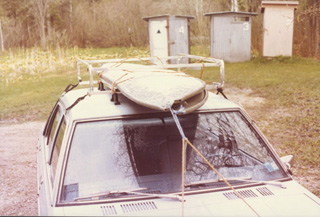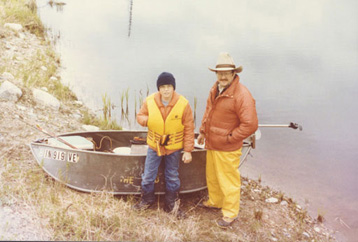SBS 301 Cultural Diversity/Prof. Koptiuch
Fall 2002 Personal Memory Ethnographies
Scott Cerreta
The Stench Around meÖ
As I recall, it was a whim not often capitalized on
by my father, but this time was different. He had the fishing bug
fueled by all the new inventions revealed to him at the Boat Show.
The poor-manís boat is what he craved. A Port-a-Boat is an eight-foot
collapsible rubber boat that gives shape to a surfboard when stowed.
When fitted with wooded sticks for saddles, the erection captures the form
of a washtub. Although not elegant, this boat has many great features.
On command, my sixty-pound, twelve-year old Twix figure coupled with unwilling
assistance from my 372-day older brother, of lesser weight and greater
stature could maneuver the board through the Indiana forest with great
speed. Within ten minutes a launch into the smallest of lakes or
most secluded of rivers is what propelled my father to act so feverishly.
However, the day would not come for this torturous memory of mine, just
yet. A shiny new unit was too expensive.

For you see, the Boat-Show fever within my father
had calmed, but it was quickly flamed four months later with the realization
that some other manís flattened log was featured in the local classifieds.
Dadís behavior was all too familiar; nightmares of slavery within me had
returned. It was confirmed. Another manís drab rubbage was soon to
be our dream catcher. And, it came at a price of one monthís groceries
and two pairs of sneakers; a far more attractive hook, comparatively, to
the two-month loss of wages for a shiny unit. The only true loss
with his decision was time, since anything of substantial cost, not meeting
the needs of family, was often placed on the back burner; grits were served
in lieu. We set off that night to purchase ìThe Tubî from smelly
black people .
The course taken to arrive at the boat sellerís home,
along with time, conversation, and presence or absence of my brother--with
the exception of the absence of light--have all been clouded from my eighteen
year memory by the funk that was so overwhelming. Money must
have changed hands, but even that I do not recall. What remains so
vivid is the stench imbedded so deeply within the rubberized walls of the
boat that my father swore would require one hundred sinkings to drown away.
This smell compounded with the extremely powerful suggestion by my father,
ìI should have bought a new boat .î His regret, not giving
up two months salary for a rubber-smelling boat, has haunted me unabatedÖ
until recently.

This torturous memory is what I refer
to as The Stench Around me. For today, I have come to realize
that the obvious difference in odor among people is real, however, that
odor is concentrated in darkness and lightened in whiteness. In other
words, odor of black people, sensed by white people is much more offensive
than similarly offensive odors of white people. This perception exists
because of socially constructed racial barriers. Now I understand
that the true stench is me, not whatís around me, and one thousand drownings
has not removed the stench from me.
ÖBelongs to the Boy in the Back?
Katherine, a friend of mine, has a personal perspective
on race much different from my own based on her life experiences while
living amongst the people in Malawi, Africa. As a peace corps volunteer,
she tended to the health care needs of the indigenous people of Africa.
In similar conditions of the Africans, Katherine was living without electricity,
central heat and cooling, a refrigerator, and hot water. Living two years
in Malawi, Katherine lived as an American, but she inherently adopted many
African traditions including infrequent bathing and lack of shaving, because
of ease and acceptability. Because of this cultural experience Katherine
has developed a different sense of smell; a sense that is based on the
individual level. Whereas Katherine was not present during my childhood
experience, she had more impact on my understanding of The Stench Around
me, than my father. Therefore this story alludes to another: ...the
Boy in the Back.
I invited Scott to join me in a house-hunting
adventure in Tucson. I am searching for a small apartment close to
the University of Arizona where I will begin my second masterís degree,
this time in Public Health with an international focus. During our
search, I found this great little place that Scott was not too fond of.
The small home had an even smaller apartment in the back, which was currently
occupied. As we looked around the main house, I was pulled by the
elegant harmony coming from the back yard. The situation reminded
me of Africa when I agreed to let a poor Malawian family occupy a shed
in the back yard of my home. We met Barakaæit means Peace or
Blessing in Malawian languageæand he was a very pleasant African
American college student. Baraka invited us in and the smells of
his home were very familiar and refreshing to me.
I was very settled with the idea of renting this home
and allowing Baraka to continue renting the cottage in the back.
However, on the drive back to Phoenix, Scottís distaste for the home became
apparent when he made a degrading racist remark regarding the ìboy in the
back,î which I will never forget. Scott complained about the stench
in the home that reminded him of black people. I was enraged with
his racist ways and we argued about smells of individuals versus his racist
comment that ìall black people smell that way.î
This experience I shared with Katherine opened
my eyes to the realization of my white-skinned privilege, of which I was
never before aware. In my childhood experience, the metaphors and
subtle hints of blackness (Twix, slavery, grits, absence of light)
were my way of showing that an individualís odor is not the issue.
Rather, my perception of those odors, the stench I described, along
with the socially constructed concept that permitted me to see black
people and not see white people, is what has been stirring inside.
Katherineís accusations of my racism were the turning point in my life.
The boy in the back and his distinctive odor triggered a belief that I
have always carried with me and imagined to be a fact. I have just
begun to realize the depth of this problem. Racism lives as the stench
inside me, and the inherent white color of my skin, perceived by others,
forever traps The Stench Around me.
I was born free, free of race. Unfortunately,
society is plagued with racism. However, despite my strong views
against racism, I still find myself cursed with racial thoughts.
With this I end: I was not born racist; I did not ask to be racist; I was
taught to be racist by the same social institution that created racismÖ
and now I must change the ways of my predecessors to remove The Stench
Around meÖ
Return to Personal Memory Ethnographies
homepage

